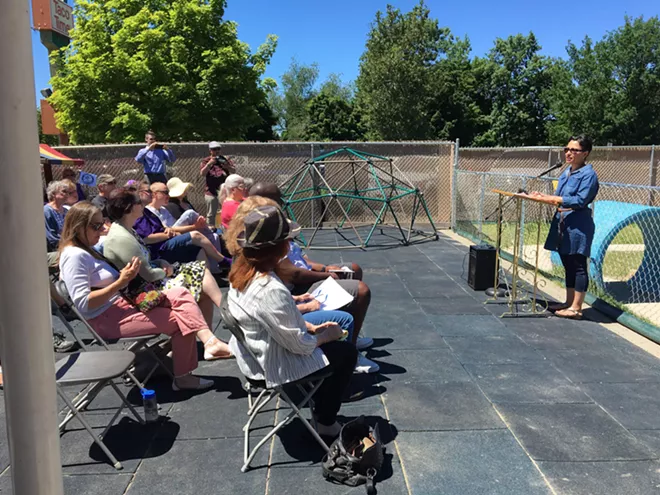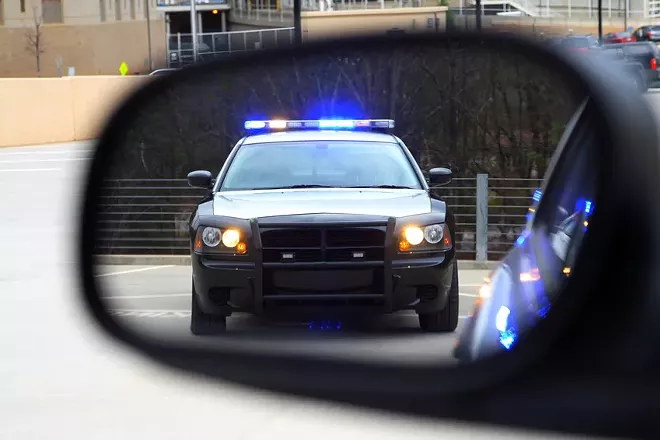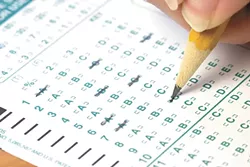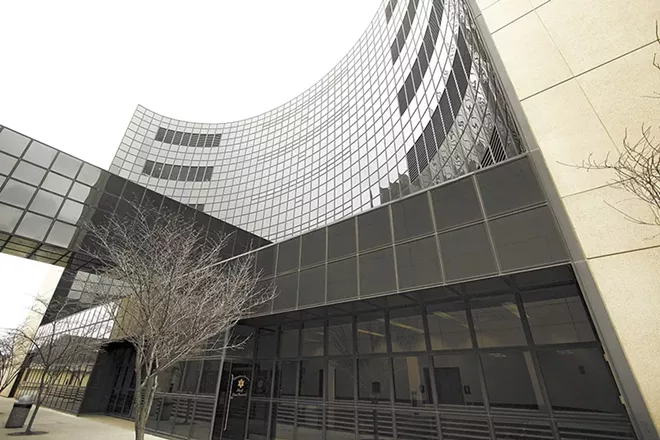Sunday, June 25, 2017
Monday, June 26
COMMUNITY | Join the Witnesses for the Climate, a gathering of experts on climate change in town to testify on behalf of the Spokane Climate Protectors, as they gather for a talk at the Community Building.
Tuesday, June 27
FOOD & DRINK | Join Liberty Ciderworks for the launch party of Spokane Scrumpy Cider, a new quaff dedicated to raising money for Second Harvest.
MUSIC | Swing on by The Observatory for the psych-rock stylings of The Love Dimension, who will be joined by Vanessa Silberman, Mujahedeen and Runaway Octopus. Here's a little sample of The Love Dimension:
FILM | The Garland Theater's Summer Camp continues with the utter awesomeness that is Pulp Fiction.
Wednesday, June 28
COMMUNITY | Join Spokane Poet Laureate Laura Read for a workshop that will help you illustrate your vision of Spokane through photos and words at the Snapshot Spokane Workshop.
Tags: What's Up? , Image , Video
Friday, June 23, 2017
With thousands of high school seniors in jeopardy of not graduating because of one failed test, the state legislature has taken action to make sure those students get their diplomas.
Thursday, legislators announced they had come to an agreement on a bill that would allow high school students to graduate even if they failed an end-of-course biology test that was required for graduation. The full legislature is expected to pass the bill next week.
In a statement, Sen. Andy Billig (D-Spokane) praised the bipartisan bill.
"Our schools today perform at high standards and no one should become a dropout at the end of their senior year simply because they do not perform well on a single, make-or-break test," Billig said. "This bill offers a path to a better future for thousands of hard-working students in our state and I am glad lawmakers were able to come together and find common ground."
Tags: washington , waleg , state testing , biology , graduation , high school , News , Image

Dr. Suzan Marshall still doesn't know for sure what happened to her husband, John, whose body was found in the Spokane River in January 2016. Marshall, who is a surgeon, has been highly critical of the Spokane County medical examiners' work on her husband's case, as well as in several other death investigations.
John Marshall's death was ultimately ruled an accidental drowning by Spokane County Medical Examiner Dr. John Howard — a conclusion that Marshall disagrees with.
In the year and a half since her husband's death, Marshall has led an effort to identify other cases where families question the medical examiners' official rulings. Earlier this year, she filed a complaint against Howard and Dr. Sally Aiken, the county's other medical examiner, with the state Department of Health, citing her husband's case and three others. A Department of Health spokesman says a total of about 10 complaints have been filed against Spokane's pathologists. Marshall has also been vocal in her criticisms of law enforcement.
Now, Marshall says, someone is retaliating against her.
Less than a week after the Inlander published a cover story earlier this month that included Marshall's critical comments, she received a letter saying that someone had filed a complaint with the DOH accusing her of "practicing beyond scope of practice."
The letter dated June 14, 2017, says the Board of Osteopathic Medicine within the state Department of Health is investigating the complaint, but it does not identify who filed it, or what specific event triggered the alleged misconduct.
"We are bound by two different laws, which may seem in conflict," the letter reads. "The first requires that we immediately notify you that a complaint has been filed. The second, the whistleblower law ... prohibits us from identifying the name of the complainant until we have received a signed waiver allowing us to do so."
"It's absolutely about giving my opinions as a trauma surgeon on autopsies," Marshall says of the accusations against her. She notes that she is not currently treating patients or practicing medicine, though DOH records show that her medical license is active. "I'm not outside my scope, and I'm perfectly happy for the medical board to verify that for everybody."
DOH spokesperson David Johnson says complainants can remain anonymous, but that could limit the department's ability to fully investigate.
The Spokane County Medical Examiner's Office did not immediately respond to requests for comment. We'll update this post if we hear back.
Tags: Suzan Marshall , Department of Health , complaint , medical examiner , John Marshall , death , Dr. John Howard , Dr. Sally Aiken , News , Image

In a season of new milestones, add another to the list for Gonzaga men's basketball. Freshman phenom Zach Collins became the first one-and-done player in program history, getting drafted by the Sacramento Kings — then traded to the Portland Trail Blazers — with the 10th overall pick in the NBA draft Thursday night.
Nigel Williams-Goss joined the party a few hours later as the Utah Jazz selected him in the second round with 55th overall pick. This is the first time in 46 years that two Zags players were drafted the same night. In 1971, Howard Burford and Bill Quigg were drafted in the 11th and 15th rounds(!). 2002 saw Dan Dickau and international recruit Mario Kasan drafted, but Kasan was mired in contract controversies during his recruitment and never suited up for the Bulldogs.
Portland took advantage of their stockpile of picks, trading their 15th and 20th to move up and take Collins. It's an interesting move for the 41-41 team, as Collins immediately slots in as a back-up to Jusuf Nurkić, with the potential to learn the power forward position and play alongside him.
Collins' draft profile was interesting due to his limited minutes at Gonzaga. The 7-footer is considered the most NBA-ready rookie big man on defense by many scouts, and already possesses a diverse repertoire of post moves. Scouts also were excited by his surprising adeptness around the perimeter, where Collins shot 47 percent last year.
Collins could prove to be a major boon for the Blazers moving forward in this new-look NBA. If he can add strength without compromising his quickness, Collins could be a rare center who is able to defend against guards off of defensive switches. Offensively, he has shown that he can make 18-plus foot shots — essential in a 3-and-D league — albeit in an extremely small sample size (14 for 27, 51.9 percent).
Tags: Gonzaga , Bulldogs , Zags , Zach Collins , Nigel Williams-Goss , Jacob Wiley , Eastern Washington , Przemek Karnowski , Jordan Mathews , Sports , Image

ON INLANDER.COM
Shutdown looming
A rally yesterday in Spokane implored the Washington state legislature to come to some sort of agreement to prevent a government shutdown on July 1.
Impatient for change
Local civil rights leaders aren't happy with the pace of progress to fix inequities in the justice system.
Teacher vs. Baumgartner
Washington 6th District state Sen. Michael Baumgartner despises the state teachers union. Next year, he's going to face a teachers union member in the 2018 election.
Pot stops
With small amounts of marijuana no longer illegal in Washington, traffic stops resulting in searches have plummeted.
Zags duo drafted
Two Gonzaga players were selected in Thursday's NBA draft: forward/center Zach Collins was traded to the Portland Trail Blazers after being picked 10th overall by the Sacramento Kings, and guard Nigel Williams-Goss was taken in the second round, 55th overall, by the Utah Jazz.
IN OTHER NEWS
Unfilled
The Spokesman-Review looks into why the city pays so very few pothole claims.
Justice delayed
Evidence that helped acquit Jason Obermiller of murdering a 2-year-old girl last year in Spokane was not disclosed by prosecutors until mere minutes before their last witness was called. (Spokesman-Review)
Kentucky Mitch and the spiral of doom
The Senate's health care bill threatens to send the individual market into the death spiral that Republicans were always warning about with Obamacare. (Vox)
Loss leader
Nancy Pelosi, the
Putin's provocation
The Washington Post reveals the inside story of how President Obama struggled to figure out how to respond to Russian hacking in the final weeks of last year's election.
Tags: Morning headlines , legislature , government shutdown , Michael Baumgartner , Paul Schneider , potholes , Jason Obermiller , acquitted , health care , Nancy Pelosi , Obama , Russian hacking , Zach Collins , Nigel Williams-Goss , News , Image
Thursday, June 22, 2017

As the state legislature inches closer to a potential government shutdown, members of the Spokane community rallied on Thursday to urge lawmakers to reach a budget deal.
With lawmakers having less than eight days to reach that deal, the All In For Action coalition hosted several protests across the state, blaming Senate Republicans for the state of stasis.
Pastor Andy CastroLang, from the Westminster Congressional United Church of Christ, was the first to take to the podium in front of a crowd of more than 50 people, stressing the importance of reaching a budget deal.
“Our budget is a moral document that reflects our values as a state,” says CastroLang. “It’s time for the Legislature to get its job done to ensure families throughout our communities do not suffer.”
If a deal isn’t reached by midnight on June 30, an estimated 32,000 state employees would stop receiving paychecks, nearly 11,000 camping reservation holders for the Fourth of july weekend will be notified of state park closures, and about 31,000 low-income, working families will lose child care payment assistance, according to the state Office of Financial Management (OFM).
“It’s time for the Senate to come to the table to avoid the devastating impacts that come along with a government shutdown,” says Luc Jasmin, director of Parkview Early Learning Center on North Division, where the rally was held.
“Thousands of families and kids depend upon not only childcare services from the state, but also access to food programs and other safety net programs. The devastating cuts in the Senate’s budget proposal are unacceptable, and it’s time for them to do what we teach our children — work together and find common ground.”
Tags: Washington , state legislature , government shutdown , Senate Republicans , News , Image

It's safe to say that, at a minimum, Washington state Sen. Michael Baumgartner is not a fan of the Washington Education Association. Anyone who follows his Twitter page knows how he feels.
After all, Baumgartner has said that the WEA would "would make a banana republic dictator blush," and accused the Washington state Supreme Court — which ruled that the state is unconstitutionally underfunding education in the controversial McCleary decision — of being "mushy-headed WEA puppets."
Baumgartner also has asked if "[longtime Zimbabwean dictator Robert] Mugabe or [Russian President Vladimir] Putin" were advising the court, and tweeted out a picture of a hammer and a bag of sand, suggest that the court should go pound sand. (We would love to link to all these comments; Baumgartner, sadly, has developed a habit of regularly deleting the tweets on his account.)
"After seven years of being in the legislature, there is no special interest group more obtuse and self-serving than the teachers union," Baumgartner tells the Inlander. "There are a lot of great teachers in the state but the WEA is an impediment to improving education in Washington state... What the teachers union does, is that it always talks about these issues in a crisis for kids, when in reality what they’re solely focused on [is] teacher pay increases and union control."
But next year, Baumgartner will face off against a dues-paying member of the Washington Education Association — Central Valley teacher and Spokane Public Schools board member Paul Schneider — in the race for his 6th District seat.
"I don’t know that Michael has done what he needs to do for students in this state. For students in this region," Schneider says. "Honestly, on education issues, he has been one of the leading obstructionists."
Schneider points to the ongoing budget stalemate — which has threatened to trigger a state government shutdown on July 1 — as evidence of the need for someone who can seek compromise.
Tags: Michael Baumgartner , Paul Schneider , 6th District , state senate , Washington Education Association , News , Image
The statistics confirm what many in Spokane have known for a long time. Racial and ethnic disparities in the criminal justice system do exist, and it's not getting better.
In Spokane County, for example, African American and Native American adults in 2014 were detained before trial 6.7 times and 6.1 times more often than white adults, respectively, according to an analysis by the W. Haywood Burns Institute. The disparity in arrests for these three groups is similar: 4.5 African American and 5 Native American adults were arrested in Spokane County in 2014 for every one white adult.
And while the average length of stay in the Spokane County Jail, regardless of race, is 17 days, African Americans spend 25 days on average, Native Americans spent 21 days and white adults spent an average of 16 days, the Burns Institute found.
Last week, a band of community leaders and activists sent a letter to members of the Spokane Regional Law and Justice Council expressing their building frustration with the pace at which the council is moving to address these disparities.
The letter, signed by 24 individuals, notes that only $20,000 of a $1.75 million grant from the MacArthur Foundation is earmarked for addressing racial and ethnic disparities. The grant is part of the foundation's nationwide Safety and Justice Challenge that also provides Spokane and 40 other cities with and access to resources, such as the Burns Institute.
"This seems to contradict the message that was communicated to the Spokane community members and stakeholders who participated in the grant application process," the letter reads. "And we are concerned that a year into the MacArthur grant's implementation, less emphasis has been placed on community engagement and racial equity than what was initially implied."
Spokane Regional Criminal Justice Administrator Jacquie van Wormer, who was heavily involved in writing the grant application, says she understands the concerns.
"If the community is frustrated about the data, I think everybody within the system is just as frustrated," she says. "But we are working on it. We hoped that we would be further along by now with that data process."
Tags: News , Spokane Regional Law and Justice Council , Jacquie van Wormer , Kurtis Robinson , racial and ethnic disparity , MacArthur Foundation , Burns Institute , Spokane County Jail , Image , Video

Washington state has seen a sharp decline in the number of traffic stops resulting in searches by state police — a result of the legalization of recreational marijuana in 2012,
A team of Stanford University researchers with the Open Policing Project studied data for
more than 130 million state patrol stops in 31 states from 2011 to 2015, including 8,624,032 stops in Washington state, the largest collection of traffic stops to date. Digging through the numbers, they reached two major conclusions: after legalization, stops resulting in searches have gone down. This could potentially result in limiting the number of dangerous clashes between drivers and police, according to Stanford researchers.
But racial disparities still exist.
“After marijuana use was legalized, Colorado and Washington saw dramatic drops in search rates,” according to Stanford researchers. “That’s because many searches are drug-related. Take away marijuana as a crime and searches go down… In Washington and Colorado, far fewer people — both whites and minorities — are searched overall. However, the racial disparities in searches remain, and there is a persistent gap in the threshold for searching white and minority drivers.”
While the Stanford research showed substantial drops in the amount of searches for all racial groups, glaring racial disparities were still apparent for black and Hispanic drivers.
“When we apply the threshold test to our traffic stop data, we find that police require less suspicion to search black and Hispanic drivers than whites,” according to the Stanford researchers. “This double standard is evidence of discrimination.”
The Marshall Project and Reveal, a weekly radio program from the Center for Investigative Reporting, partnered to review the stop-and-search data, finding a 34 percent decrease in the search rate for black drivers, while the search rate for white and Hispanic drivers decreased by about 25 percent.
Yet racial disparities were still apparent before and after legalization. The Marshall Project analysis of Washington State Patrol data showed that black drivers were still searched roughly twice as much as white drivers, and Hispanic drivers were searched about 1.7 times as much as white drivers.
Tags: police , Washington State Patrol , marijuana , traffic stop , Stanford , Open Policing Project , News , Image
ON INLANDER.COM
NEWS: These grannies have had it. For decades, the gaggle of quirky women (and men) have tried to call attention to global climate change with little effect. Now the 60- and 70-somethings have resorted to breaking the law. Next week, they'll make their case to a judge.
MUSIC: Ahead of Rhymin' Paul Simon's stop at the Spokane Arena tomorrow, music editor Nathan Weinbender ranks his post-Simon and Garfunkel discography.
ECSTASY: When you unwittingly take the euphoric drug at a wedding in Australia, and Slayer is blaring, and the "joyous cherub" of a best man is not persuaded by your nihilistic worldview, there is peace.
IN OTHER NEWS
Verdict: not guilty
The man accused of beating a 2-year-old to death was acquitted yesterday. Jason Obermiller was charged with murder in the death of Adalynn Hoyt, the daughter of Lovina Rainey. He remains in Spokane County Jail, facing federal drug charges. Obermiller's attorneys say they believe Rainey and another man were involved in the child's death. (Spokesman-Review)
Repeal and replace
Senate Republicans released their plan to repeal and replace the Affordable Care Act. It will begin to phase out Medicaid expansion by 2021, repeals the "individual mandate" that requires almost all Americans to carry health-care coverage, cuts taxes for wealthier Americans and bars Medicaid patients from getting treatment at Planned Parenthood. (Vox)
Psych docs' videos
Video depositions of the two psychologists said to be the architects of the CIA's torture interrogation program have been released. John Bruce Jessen and James Mitchell, who had an office in Spokane, say they were pressed to continue the controversial interrogation tactics — such as waterboarding — despite their reluctance. Their statements in the newly released depositions clash with previous portrayals of the men as "eager participants," the New York Times reports.
"I think the word that was actually used is that 'You guys are pussies,'" Mitchell says in sworn testimony released as part of a federal lawsuit filed in Spokane. The ACLU sued the psychologists on behalf of former detainees.
Tags: News , Jason Obermiller , acquitted , Senate Republicans , health care , Medicaid , CIA , interrogation , John Bruce Jessen , James Mitchell , Image






